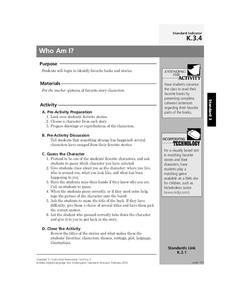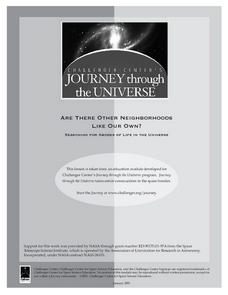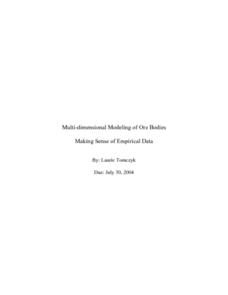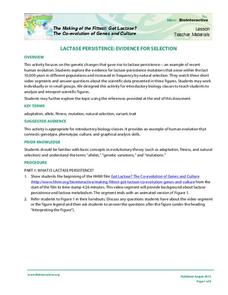Curated OER
Who Am I?
Students read a story together then choose a favorite character to portray. In this inference lesson, students pretend to be one of the characters in the story, they prepare drawings or actions then present them to the class. Students...
Curated OER
Measuring Snowfall
Students predict the amount of snowfall for the week and measure snowfall. In this measuring snowfall lesson, student use a precipitation gauge to measure the week's snowfall; and analyze the data to determine whether or not...
Curated OER
Cool! Awesome! What is it?
Students infer what a mysterious object is in a photo. For this inference lesson, students practice their scientific skills to identify what they see. Students enjoy solving the mysterious identity of objects and extending their...
Curated OER
Ornithology and Real World Science
Double click that mouse because you just found an amazing lesson! This cross-curricular Ornithology lesson incorporates literature, writing, reading informational text, data collection, scientific inquiry, Internet research, art, and...
California Academy of Science
Human Evolution
As the great and hilarious Tim Minchin once said, "Science is simply the word we use to describe a method of organizing our curiosity." Science is more than just a guess; it is based on questions, observations, and evidence. High...
Curated OER
The Water Cycle
Fifth graders explore the major components of the water cycle. They pay close attention to evaporation, condensation, and precipitation. A water cycle kit is set up in the classroom, which learners observe for a couple of days before the...
PBS
Does Art Imitate Life?
Write what you know, sound advice for any writer and something many famous authors are known to have done. Use these materials to explore how Shakespeare's life influenced his plays. This resource is packed with readings, video segments,...
National Wildlife Federation
Get Your Techno On
Desert regions are hotter for multiple reasons; the lack of vegetation causes the sun's heat to go straight into the surface and the lack of moisture means none of the heat is being transferred into evaporation. This concept, and other...
KERA
Matisse and Picasso
Discover Modernism through the eyes of artists. Over the course of six well-thought-out lessons, learners examine works by Pablo Picasso and Henri Matisse while completing a range of collaborative and hands-on activities. A great resource!
Curated OER
Basic Excel
Students explore basic Excel spreadsheets. In this spreadsheet lesson plan, students enter Alaska weather information and perform calculations. Students title the columns on the spreadsheet and format the cells. Students complete...
American Psychological Association
A Tasty Sample(r): Teaching about Sampling Using M&M’s
Here's a sweet activity! As part of a study of psychological research methods and statistic gathering, individuals develop a hypothesis about the number of each color of M&Ms in a fun-size package. They then count the number of each...
Curated OER
Sending Messages to Space
Young scholars interpret a message sent to space using a radio telescope and draw inferences from the interpreted message. Working with a partner, they interpret data that scientists believe is a message from aliens. They work on...
Curated OER
Clouds
Students explore clouds. In this weather lesson, students identify the steps in the water cycle, define condensation and evaporation, and relate this information to cloud formation. Students perform a cloud experiment, predict weather...
Curated OER
What Makes you Hot?
Learners manipulate different variables in a model and make inferences about the temperature on Earth. In this heat lesson students calculate the blackbody radiation of an object at a certain temperature.
Curated OER
The Milk Bottle Quiz
In this scientific statements worksheet, students identify statements as an observation, inference, question, prediction, or factual. This worksheet has 7 matching questions.
Curated OER
Red, Green, and Blue Mystery Liquids! Hypothesis or Inference?
Eighth graders are actively involved in the scientific method and inquiry as they form quick hypotheses based upon a teacher set of mystery liquids. They determine the need to make additional observations of the liquids.
Curated OER
The Making of an Organ
Students examine and research how cells make up our organs. They create a model of a tongue showing cells, tissues and the organ.
Curated OER
Make a Snowflake
Students study the design of snowflakes. In this snow lesson, students discover the different shapes of a snowflake, and their similarities. Students study snowflakes outside, then create their own with popsicle sticks and glue.
Curated OER
Civil War: The North History Lesson
Students demonstrate their reading comprehension skills, including reading strategies, inference, literal meaning, and critical analysis.
Curated OER
temperature and the Scientific Method Lesson Plan
Sixth graders study heat, temperature, and heat transfer. Using probeware, the teacher demonstrates boiling points. Students participate in experiments and record the beginning and ending temperatures and mass of objects. After...
EngageNY
Using Sample Data to Compare the Means of Two or More Populations II
The 23rd segment in a series of 25 presents random samples from two populations to determine whether there is a difference. Groups determine whether they believe there is a difference between the two populations and later use an...
National Endowment for the Humanities
Theme Analysis in A Christmas Carol
Why does Charles Dickens have Ebenezer go from scrooge to light-hearted and generous? From "Bah, humbug!" to "God Bless Us, Every One!" After rereading Dickens' preface to A Christmas Carol, learners analyze quotations from the tale that...
Curated OER
Multi-dimensional Modeling of Ore Bodies Making Sense of Empirical Data
Math scholars identify four different rock types in that strata and use this identification and data to construct a two dimensional geologic cross-section. They use data tables to construct a three-dimensional geologic cross-section.
Howard Hughes Medical Institute
Lactase Persistence: Evidence for Selection
What's the link between lactase persistence and dairy farming? Biology scholars analyze data to find evidence of the connection, then relate this to human adaptation. Working individually and in small groups, learners view short video...

























